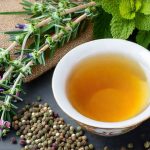Prostate health is often a topic discussed in hushed tones, yet it impacts a significant portion of the male population as they age. Many men experience discomfort associated with prostate issues, ranging from frequent urination to more persistent challenges. While medical intervention and lifestyle adjustments are crucial components of managing these concerns, incorporating soothing evening routines can also play a supportive role. A warm cup of tea before bed isn’t just about relaxation; carefully chosen herbal teas may offer gentle assistance in easing some symptoms and promoting overall well-being. It’s important to remember that teas aren’t cures but rather potential complementary additions to a holistic health approach, best discussed with a healthcare professional.
This article explores the fascinating world of evening teas specifically considered for prostate relaxation. We’ll delve into the herbal properties believed to contribute to comfort and discuss how incorporating these beverages into your nightly routine might be beneficial. The goal is not to provide medical advice – always consult your doctor regarding any health concerns – but rather to offer informed insights into options that some individuals find helpful alongside conventional treatments. Understanding the nuances of each tea, its potential benefits, and considerations for usage will empower you to make informed choices about incorporating them into your wellness plan.
Herbal Allies: Teas Traditionally Associated with Prostate Support
The connection between certain herbs and prostate health isn’t new; traditional medicine systems have long utilized plants known for their soothing properties. Many of these traditions emphasize a holistic approach, recognizing the interconnectedness of mind and body. While modern science is still exploring the full extent of herbal efficacy, preliminary research and centuries of anecdotal evidence suggest that specific teas may offer some degree of support. It’s crucial to choose high-quality herbs from reputable sources, ensuring purity and potency. Look for organic options whenever possible to minimize exposure to pesticides and other unwanted chemicals. Creating a peaceful atmosphere during your tea drinking experience can be enhanced by incorporating elements found in Evening Reset Rituals for Prostate Peace.
The key isn’t just what tea you drink but also how you prepare it. Proper brewing methods are essential to extract the beneficial compounds from the herbs. Generally, using filtered water heated to the appropriate temperature (avoiding boiling for delicate herbs) and allowing sufficient steeping time will yield a more potent and flavorful infusion. Experiment with different steeping times within recommended ranges to find what works best for your taste and perceived benefits. Furthermore, be mindful of potential interactions with any medications you’re taking – again, consulting your doctor is paramount before introducing new herbal remedies into your routine.
Finally, remember that consistency is often key. Incorporating an evening tea ritual isn’t about a one-off fix; it’s about establishing a calming habit that supports ongoing well-being. If you are looking for other ways to support prostate health beyond teas, consider exploring Simple Routines for Long-Term Prostate Support. For those seeking additional dietary guidance, understanding Best Vegetables for Prostate and Kidney Health can complement your holistic approach.
Saw Palmetto: A Well-Known Herbal Remedy
Saw palmetto (Serenoa repens) is arguably the most widely recognized herb associated with prostate health, particularly in relation to benign prostatic hyperplasia (BPH). While scientific evidence remains somewhat mixed, numerous studies suggest it may help alleviate urinary symptoms such as frequent urination, urgency, and difficulty starting or stopping urination. The proposed mechanism involves inhibiting an enzyme that converts testosterone into dihydrotestosterone (DHT), a hormone believed to contribute to prostate enlargement.
- It’s important to note that saw palmetto tea often has a slightly bitter taste, which some people find unappealing.
- Combining it with other herbs or adding a touch of honey can improve its palatability.
- Look for standardized extracts in tea blends to ensure consistent potency.
Preparing saw palmetto tea typically involves using the berries (or an extract thereof) steeped in hot water for 10-15 minutes. Dosage varies, but starting with one cup per day and monitoring your response is advisable. Be aware that saw palmetto may interact with blood thinners and other medications, so consulting your physician beforehand is essential. It’s also important to choose a reputable brand that tests for purity and heavy metals.
Corn Silk: A Gentle Diuretic
Corn silk, the silky strands found inside an ear of corn, has been used traditionally as a gentle diuretic and urinary tract tonic. While less well-known than saw palmetto, some research suggests it may help reduce bladder irritation and improve urinary flow. Its diuretic properties can assist in flushing out toxins and reducing inflammation within the urinary tract. This makes it potentially helpful for individuals experiencing discomfort related to prostate issues that cause increased urinary frequency or urgency.
Corn silk tea is incredibly mild in flavor, making it a good choice for those who prefer subtle herbal infusions. It’s often combined with other herbs to enhance both its taste and potential benefits. To further support kidney health alongside corn silk, explore Best Vegetables for Prostate and Kidney Health. Preparing corn silk tea involves steeping the fresh or dried silk strands in hot water for 10-20 minutes. Consider sourcing organic corn silk to avoid pesticide exposure.
Nettle Leaf: Nutritional Support & Potential Benefits
Nettle leaf (Urtica dioica) is a nutritional powerhouse, rich in vitamins and minerals like Vitamin K, iron, and antioxidants. While not directly targeting the prostate, nettle leaf’s potential anti-inflammatory properties and its ability to support overall kidney health may indirectly contribute to improved urinary function. It’s often used as a gentle diuretic and can help balance fluids within the body.
Nettle leaf tea has a slightly grassy flavor that some find pleasant while others prefer to mask with lemon or honey. – Nettle leaf is known for its stinging properties when fresh, but this is neutralized during drying and brewing. – It’s crucial to avoid harvesting wild nettle unless you are absolutely certain of your identification skills. For a broader perspective on dietary support for prostate health, consider Balancing Daily Fluids for Prostate Calm. Remembering the importance of hydration, explore Daily Water Portioning for Prostate Comfort to optimize fluid intake.
Steep dried nettle leaf in hot water for 5-10 minutes. Start with one cup per day and monitor your body’s response. Nettle leaf may interact with certain medications, particularly diuretics and blood pressure medication, so medical consultation is vital before regular consumption.
The information provided here is intended for general knowledge and informational purposes only, and does not constitute medical advice. It is essential to consult with a qualified healthcare professional for any health concerns or before making any decisions related to your health or treatment. Self-treating can be dangerous, and it’s important to receive personalized guidance from a doctor who understands your individual needs and medical history. If you are interested in learning more about potential treatments, research Options for localized prostate cancer therapy.





















